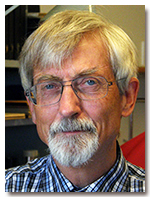Since 2002, the Society for Biological Systematics (GfBS) has raised members to the status of honorary members in order to honor their services to the science of systematic biology. Since then, six scientists have been elected honorary members.
 |
(*1953)
Until 2019, Wolfgang Wägele was director of the Zoological Research Museum Alexander Koenig (ZFMK) and at the same time professor for special zoology at the Rheinische Friedrich-Wilhelms-Universität Bonn. Professor Wägele is an expert in the systematics and phylogeny of marine crustaceans, especially isopods. He is working on the theory of cladistics and molecular phylogenetics. He is also interested in automated methods of recording biodiversity for monitoring. In 2015 the zoologist became a member of the Academy of Sciences and Literature Mainz. From 2003 to 2007 he was President of the Society for Biological Systematics, in which he has been involved since it was founded in 1997.
The laudation on the occasion of his appointment was given by Prof. Dr. Uwe Fritz during the annual meeting of the GfBS in Munich.
 |
(*1943 - †2014)
Niels Peder Kristensen was an entomologist and systematist and has been a member of the Royal Danish Academy of Sciences since 1988. He has written several important works on insects, especially butterflies. Many scientists consider him the most important phylogeneticist about Lepidoptera, as Ulrike Aspöck described in her laudation.
The laudation on the occasion of his appointment was given by Prof. Dr. Ulrike Aspöck during the annual meeting of the GfBS 2008 in Göttingen (see GfBS Newsletter No. 20, download pdf, see page 48ff).
(*1927 - †2023)
Friedrich Ehrendorfer is considered to be one of the pioneers of modern plant systematics. By combining caryological, molecular and morphological analyzes, he has significantly advanced the comparative evolutionary research and biosystematics of higher plants. He was co-editor of the Strasburg textbook on botany for universities and initiated an atlas of distribution of vascular plants in Europe. His great merit is the interdisciplinary discussion between different botanical disciplines.
The laudation on the occasion of his appointment was given by Prof. Dr. Johanna Eder during the annual meeting of the GfBS on September 15, 2004 in Stuttgart (GfBS Newsletter no. 13, download pdf, see page 14ff).
(*1927 - †2013)
The main research areas of the Hamburg-born zoologist Ax were the microfauna of the sea floor, the so-called "sand gap system", for which Ax founded his own scientific journal, the Microfauna marina. Ax discovered the first tunicate living in the sand gap system of the German coast and an entire new animal phylum, the Gnathostomulida, which also inhabit the sand gap system. His outstanding textbook The Phylogenetic System appeared in English only three years after the German edition.
Text from a short biography in the GfBS Newsletter No. 11 (download pdf, see page 15)
The laudation was given by Prof. Dr. Rainer Willmann from Göttingen on September 17, 2003 in Dresden (GfBS Newsletter No. 11, download pdf, page 17ff).
 |
(*1904 - †2005)
Ernst Mayr, who grew up in Germany, was an evolutionary biologist. In 1942 his famous work Systematics and the Origin of Species was published, which co-founded the new Synthetic Theory of Evolution, which combines the disciplines of population genetics, evolution theory and zoological systematics. The book Artbegriff und Evolution, published in Germany in 1967, was of similar importance.
From a brief portrait in the 11th GfBS newsletter (download pdf, see page 16). Matthias Glaubrecht wrote a detailed obituary for Mayr in the GfBS newsletter (download pdf, no. 14, page 11).
The laudation was given by Prof. Dr. Jürgen Haffer from Essen on September 17, 2003 in Dresden (GfBS Newsletter No. 11, download pdf, see page 20ff).
 |
(*1924 - †2022)
Paleontologist Erich Thenius researched the fauna of the Tertiary and Ice Age, which he described in several hundred publications, including 30 books. His focus was the evolution of modern and fossil mammals. In 1962 he became Professor of Mammalian Paleontology and Deputy Director of the Institute for Paleobiology at the University of Vienna. In 1987 Professor Thenius became a member of the German Academy of Sciences Leopoldina in Halle.
The laudation was given by Prof. Dr. Gerhard Haszprunar in 2002.
Gernot Rabeder und Friedrich Steininger wrote a German obituary for Thenius in GfBS's Newsletter no 42 (see page 40).